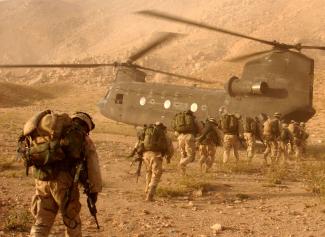Afghanistan
Unfinished business
 picture-alliance/Photo12/Ann Ronan Picture Library
US soldiers boarding a helicopter in Afghanistan in late 2001.
picture-alliance/Photo12/Ann Ronan Picture Library
US soldiers boarding a helicopter in Afghanistan in late 2001.
In late February, the superpower USA signed an agreement with the insurgent Taliban militants after almost two decades of bloodshed. This seemingly endless war was very expensive. It was a result of the 9/11 terror attacks on New York and Washington in 2001. Only a few weeks later, US troops toppled the Taliban who were running a theocratic dictatorship in Afghanistan. They were Islamist extremists who had provided a haven to Al-Qaida, the terrorist organisation.
From the perspective of ordinary Afghans, the US invasion was a unique opportunity for the reconstruction and democratisation of the country. For the first time in history, Afghanistan held free and fair elections. Despite a tense security situation, a new sense of freedom was palpable. Women and girls were enabled to study and work, for example.
When the US invaded Afghanistan more than 18 years ago, the promise was not just to topple the Islamists. Human rights, women’s emancipation, freedom of speech and the protection of minorities were high on the agenda. None of that seems to matter to Washington anymore. What the White House wants is simply to bring the troops back home. US President Donald Trump promised to do so in the 2016 campaign.
Politicians’ promises are often excessively simple. The truth is that the USA has been deeply involved in Afghanistan’s fate at least since the Soviet invasion of the country in 1980. Washington supported militias that fought the Red Army, and the Taliban emerged from those groups.
As it did when the war began, the USA is again acting on its own. Back then, it soon got support from allies, including NATO. The international community endorsed the new start. However, no ally or multilateral institution was involved in the peace talks. It is even more depressing, that no one from Afghanistan’s government took part. Neither civil-society organisations nor any other institution had a say.
The agreement now essentially spells out that the Taliban will not fight the USA, nor support any organisation that poses a threat to the USA. In return, the Trump administration will no longer consider the Taliban to be terrorists. Their leaders will be taken off the US blacklist, and prisoners are to be released.
The White House now seems to believe that the Taliban will somehow become a normal political party and peacefully participate in Afghanistan’s current political order. That is wishful thinking. The Taliban’s track record shows that they want to return to power without restraints. The depressing reality, moreover, is that the international community has not been able to foster the development of a strong and self-supporting constitutional order in Afghanistan. The elected government is haunted by internal divisions and corruption.
Things could have been different had Washington also prioritised institution building beside hunting down terrorists. There was so much “collateral damage” that far too many people began to see the international troops not as foreign liberators, but as violent oppressors. Adding to the problems, opium continued to be the most important export good. A peaceful constitutional order is improbable in any country where an illegal industry dominates the economy. The international community, led by the USA, failed to tackle this issue in any serious way.
The ethnic composition of Afghanistan, moreover, also makes the current peace deal problematic. To the outside world, the Taliban may look like a group of religious extremists. To Afghan eyes, however, they are a Pashtun outfit with a long history of fighting other ethnically defined groups. When the US invaded Afghanistan, the Northern Alliance, which is based on specific ethnic groups, was its ally. Some Northern Alliance leaders are now in the government. They have reason to feel betrayed by Trump.
In 1989, the hasty exit of Soviet troops left behind a huge mess. That is exactly what the hasty withdrawal of US troops will most likely result in now. There is a serious risk of renewed civil war, with the Taliban on one side and the Northern Alliance on the other. Sooner or later, the US or other foreign powers would be drawn into the conflict once more.
Nawid Paigham is a political and economic analyst.
npeigham@gmail.com

